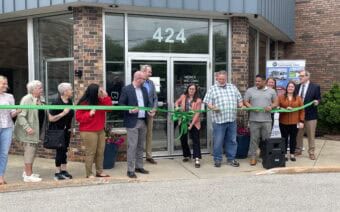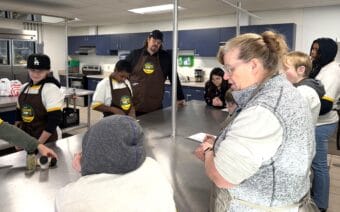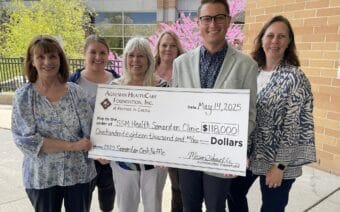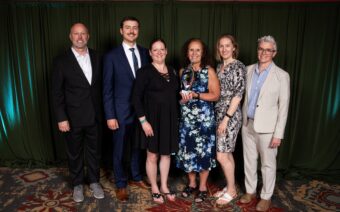
October 3, 2023
GREEN BAY – “Love knows no bounds” – this well-known quote could be seen as a reflection of how Dr. Rolf Lulloff has lived his life.
The now-retired orthopedic surgeon spent his professional career helping patients at HSHS St. Mary’s Hospital Medical Center, and now spends his days in retirement volunteering his time to help others who have or may have Parkinson’s – a disease Lulloff said he came to know well through his late wife, Ann.
“We moved into our house in Allouez in July of 1976,” he said. “And that late fall, early winter, all of a sudden, one day she lost her sense of smell.”
This, Lulloff said, would take the couple on a journey they never imagined they would take – discovering Ann had Parkinson’s.
Over the next several years, Lulloff stood by Ann’s side as they navigated the many unknowns of Parkinson’s – a disease that, at the time, they knew very little about.
Despite Ann’s first symptom of Parkinson’s appearing in 1976, Lulloff said she didn’t receive an official diagnosis until 13 years after, in 1989.
As more and more symptoms presented themselves and more and more doctors weren’t able to pinpoint what exactly was causing them, Lulloff said Ann did her best to live a normal life.
By 40 years old, Lulloff said Ann started to develop a tremor, move slowly and didn’t have good balance.
It wasn’t until age 49 when Lulloff said a doctor noticed Ann’s symptoms at a Christmas party, that she would finally receive a diagnosis.
“We went to see the doctor on New Year’s Eve, 1989,” he said. “And he said…, ‘you’ve got Parkinson’s disease.’ He explained what the disease was like. There was no cure for it at that time, but there was a lot of research being done. And you could take medicine that controls some of the (motor) symptoms.”
It was then that Lulloff said Ann told him, “‘my life is over.”
“I said, ‘Annie, I love you dearly,’” Lulloff said. “The enemy is Parkinson’s disease. It’s not your fault, it’s not my fault. We will make a difference with this.”
And make a difference they did.
Lulloff said the next 31 years of Ann’s life were dedicated to making sure she lived as best as she possibly could.
It also launched him on his own journey to better understand Parkinson’s and the brain.
Digging deeper
As Lulloff learned more about the disease, he said it’s comparable to a “smoldering fire.”
“The brain develops abnormal protein clumps, called Lewy bodies, and that’s an abnormal protein,” he said. “(They) interfere with how the nerves in the brain and the nerves in the body work.”

Dr. Rolf Lulloff
Part of living a good life with Parkinson’s, Lulloff said, is to keep moving – and that’s exactly what he and Ann did.
“We kept doing things,” he said. “We filled our household with hugs, with music (and) with dancing. We traveled, we socialized – we almost always had something we were looking forward to.”
Over the years, Lulloff said he accumulated a lot of research, which he eventually decided to share with others in a book, titled: “Living and Loving with Parkinson’s Disease: Our Partnership Through a 45-Year Journey.”
Lulloff said the book is geared toward those dealing with Parkinson’s disease or someone close to someone with the disease – and includes tips and tricks he used throughout Ann’s journey.
Lulloff said his wife passed away at the age of 80 in their home without pain or suffering.
Founding the Brain Center
A few years before Ann’s passing, Lulloff said he ran into long-time friend Dr. Dave Donarski – a meeting that eventually led to the founding of the Brain Center of Green Bay (2801 S. Webster Ave.).
After Donarski asked how Ann was doing, Lulloff said the conversation pivoted to other neurological diseases.
“He said, ‘you know, there’s so much more than can be done for people with diseases like that,’” Lulloff said. “And I said, ‘I agree.’ He said, ‘we should meet together and talk about that.’”
From then on, Lulloff said the two met every Tuesday morning.
During one of their conversations, Lulloff said they stumbled upon an article about neural plasticity.
“(It was about) getting rid of bad habits and training your brain to do good things,” he said. “It turns out that the PoNS (Portable Neuromodulation Stimulator) stimulation device to help people with MS and Parkinson’s had been developed at the University of Wisconsin-Madison. It took us nine months to get in and tour the layout (of the lab).”
In the meantime, Lulloff said he and Donarski’s Tuesday morning roundtable grew – adding Dr. Richard Horak, Dr. Dan Koster and Dr. Michelle Koster to the group.
“After doing that for about six months, we said, ‘are we just going to sit here and talk about this or are we going to do something that will make a difference?’” he said.
They did something – coming together to start the Brain Center – a nonprofit organization offering a life-long approach to good brain health.
The center’s services, Lulloff said, come at no cost to those who come in.
And, thanks to some “wonderful benefactors,” he said the center now has three full-time employees.
The five founders, along with other coaches, are all volunteers.
However, Lulloff said he wanted to make it clear the team is not meant to replace someone’s doctor.
“(People) know we’re not their doctor – they have to have their own doctor for medication,” he said. “But we spend time (with them) and help guide them in their journey – there’s so much more we’ve learned and studied. Doctors don’t have time to spend an hour and a half with somebody. We’re retired, and we’re motivated and we can, so we do.”

Dr. Rolf Lulloff, along with Dr. Dave Donarski, Dr. Richard Horak, Dr. Dan Koster and Dr. Michelle Koster decided to found the Brain Center after spending months meeting weekly to talk about neurological issues. Submitted Photo
When someone comes in for a session, Lulloff said coaches will use the six pillars for brain health, which are:
Quality fuel and nutritionPhysical exerciseRestorative sleepCognitive stimulationStress managementAvoidance of injury, illness and toxins
“With that first visit, it takes me an hour to get their history and to tell them who we are, who I am and why I can give them some advice,” he said. “Then we get going on what their lifestyle habits are and what they can be doing. We want their care partner there if they have one… a spouse or family members.”
Coaches at the Brain Center, Lulloff said, also help with Alzheimer’s and related dementia, preventative brain health and wellness and traumatic brain injuries.
Helping others
Lulloff said there are many reasons why he chooses to spend his retirement helping others.
“I’m 81 – I want my brain to work well,” he said. “To have my brain work well, I need to be physically active.”
Another reason, Lulloff said, is for brain stimulation.
“What stimulates my brain more than sitting down with somebody and figuring out what their challenges are and what we can do to help them?” he said. “That stimulates my brain, but it’s beneficial to them – that makes a huge difference. Why do I want to get on the golf course when I can help somebody a lot?”
Lulloff said the other reason he helps others is to keep Ann’s legacy alive.
“She taught me so much, and that carries on,” he said. “When she took her last breath, she didn’t leave me. She is still with me because her example lives on with me.”
At the end of the day, Lulloff said it all comes down to a choice.
“We can ignore things we’ve experienced,” he said. “Or, we can take advantage of the things we’ve learned.”
While Lulloff continues to honor Ann’s legacy through his work at the Brain Center, he said “it’s not about us.”
“This is about a mission in helping people,” he said. “We happen to be the tools to do it. These things are in need. There are so many good things being done and potentially can be done. We need to do that.”
 De Pere, Greener Bay Compost team up to fight food waste
De Pere, Greener Bay Compost team up to fight food waste Honoring family history, while embracing the future
Honoring family history, while embracing the future








